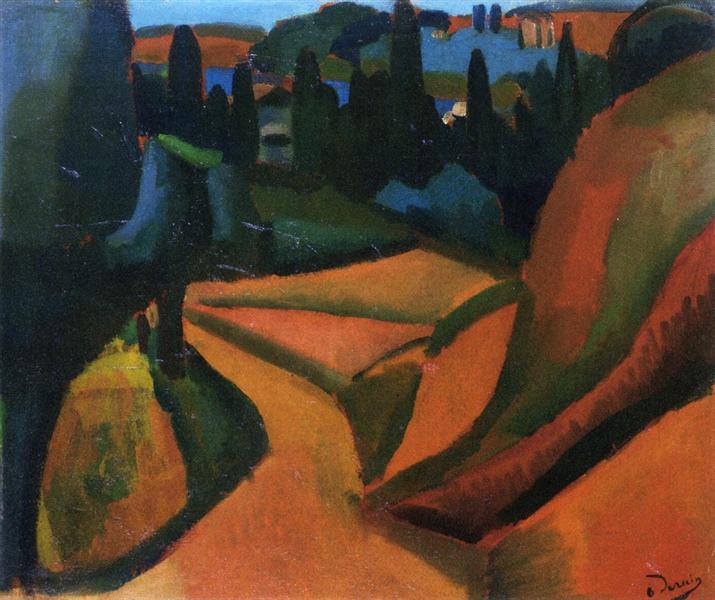Description
The painting "Landscape near Martigues" (1908) by André Derain is a work that encapsulates the vibrant essence of Fauvism, an artistic movement that broke with the conventions of impressionism and stood out for its bold use of color and shape. In this work, Derain, a pioneer of Fauvism with his colleague Henri Matisse, plays with the color palette in a way that defies the naturalistic representation of the landscape, offering the viewer an intense and emotional visual experience.
The composition of "landscape near Martigues" is characterized by an almost structural approach, where the landscape elements are articulated by using the color that transcends the mere representation. The trees, painted with tones of vibrant and blue green, rise firmly on the landscape, while the sky, a show of deep blue and orange, offers a feeling of depth and movement. Loose and dynamic brushstrokes are characteristics of Derain's style, allowing the pictorial quality to be almost tangible, inviting the viewer to feel the breeze and heat of the Mediterranean landscape.
The absence of human figures in this painting It allows the approach to focus on nature itself. However, the use of organic forms and the disposition of the elements creates a visual melody that suggests an intimate connection between man and the environment. The choice of Martigues, a place that Derain visited in southern France, is not accidental; This region is known for its colorful and luminous landscapes, which undoubtedly influenced the vibrant palette that the artist uses in this work.
Dissecting the fauvista character of this painting, it is crucial to notice how Derain uses color not only to describe, but to express emotions. This Dionysian principle, where color becomes a language in itself, is particularly evident in tonal transitions and the contrast between the warm and cold colors that generate a visual and emotional tension. This work is a perfect example of how Fauvism was not limited to being a mere exploration of color, but sought to redefine the interaction of the viewer with the landscape.
"Landscape near Martigues" is also a reflection of Derain's evolution as an artist in the context of modern art. After having established strong links with the forms and emotions of impressionism, its transition to Fauvism marks a crucial moment in its personal and artistic development. These same ideas about the use of color and form can also be seen in other contemporary works to this period, where artists such as Maurice de Vlaminck and Matisse explored similar concepts in their landscapes.
Through Derain's gaze, "landscape near Martigues" invites us to reconsider our relationship with the environment: the canvas becomes not only a place of representation, but into a space where nature becomes a sensory experience. The work embodies the essence of Fauvism by presenting a landscape that lives and breathes in the color universe, in a constant dialogue between the artist, nature and the spectator. In its apparent simplicity, "landscape near Martigues" offers us a window to the rich poetic of Fauvism, which continues to resonate in contemporary art.
KUADROS ©, a famous paint on your wall.
Reproductions of paintings handmade oil, with the quality of professional artists and the distinctive seal of KUADROS ©.
Art reproduction service with satisfaction guarantee. If you are not completely satisfied with the replica of your painting, we refund your money 100%.

